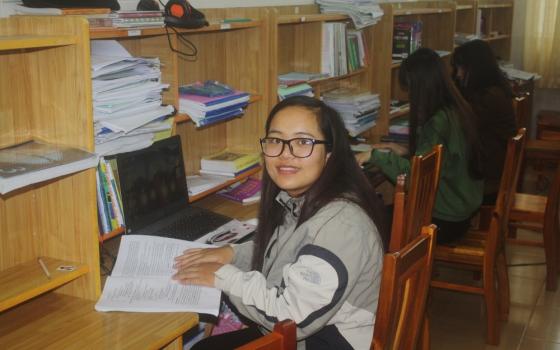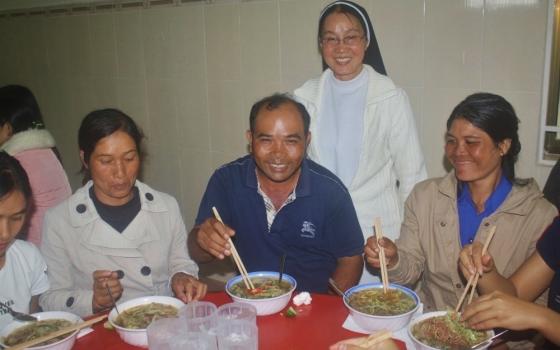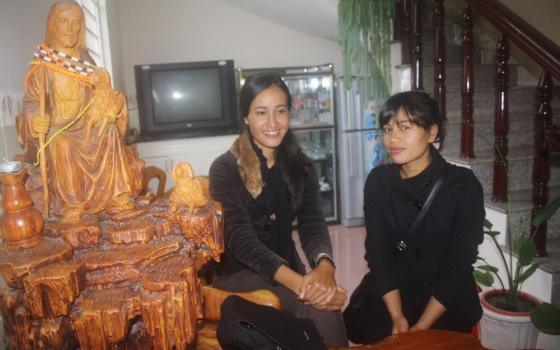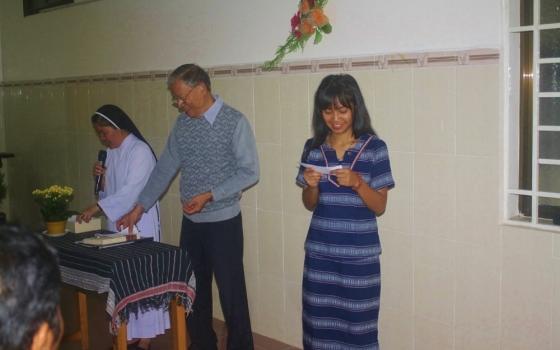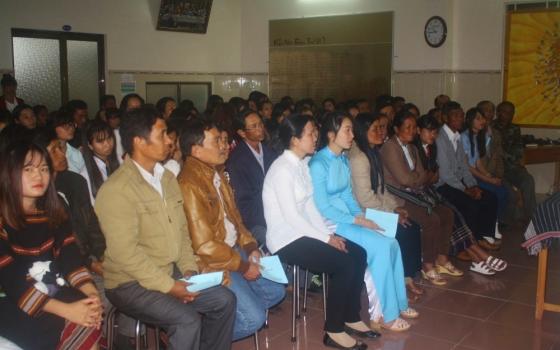Studying at a university is normal for many people in the world, but it is unusual for Mary Yok Rolak Jrai. In a country where ethnic minorities make up 13 percent of the population but account for 40 percent of the people living in poverty, Jrai is an exception. She is from the Ma ethnic minority and grew up in Lam Ha District of Lam Dong province, in Vietnam's remote Central Highlands.
Jrai is 23 and comes from a family with 10 children. Some of her siblings are illiterate, some finished elementary school, and only one graduated from high school. Seven of them got married when they were teenagers.
"When I finished 12th grade, my parents asked me to stop further studies and work to support the family because my parents have no money to cover my studies at college," she said. Her family cultivates coffee trees and rice for a living.
She said she wanted to change her life, so she was determined to study at a university. Fortunately, she was introduced to the Huong Duong Dormitory run by Dominican sisters in the city of Da Lat.
The nuns provide her very affordable accommodations and even scholarships so she can attend a four-year course at Dalat University.
They also provide a supportive structure that helps her be successful in college.
"It is important that sisters teach me moral values and ways to deal with problems, work on schedule, cooperate with other people, and treat people with respect, kindness and consideration," Jrai said. She has also attended classes in English, music and prayer and outdoor activities held by Salesian Don Bosco priests.
After she graduated from a social work program last July, she started working at a local hotel in August and sends money to support her family.
"I would never have graduated from the university without the nuns' support. I am deeply grateful to them," said Jrai with a smile.
Dominican Sr. Clare Nguyen Thi Lien heads up the dormitory. She said the facility now gives food and accommodation to 75 female students who study at local colleges and universities. Forty of the women are from ethnic minority groups, K'hor, J'rai, Ma, Chu Ru and M'nong.
Lien said the dormitory, built in 2009, aims to provide conditions to female students from poor families, especially ethnic minorities, that allow them to study at colleges. "Ethnic villagers pay little attention to their children's education, have no money to cover school fees and have their daughters get married early," she said.
The building has a chapel and rooms for dining, computer use, studying and sleeping.
Room and board cost each student 1.1 million dong (U.S. $49) per month. However, the nuns help get financial aid for the students when possible.
"We visit students' families, looking at their situations and deciding how much we can help them," Lien said. "We try to ensure all students' basic needs so that they can do their best at college and avoid their family pressure on them to work."
Lien and two other nuns at the dorm also teach the students human values, living skills and ways to deal with their personal problems, and they monitor their performance at school. They invite doctors to look after their heath and foreigners to teach them English.
"Here we live in a pleasant, safe and healthy environment. Our parents really feel at peace with us," Teresa Nguyen Thanh Huong, a second-year student who studies Korean, said. "We attend daily Mass to strengthen our faith."
Teresa Ka Dung, a fourth-year student of math and computer science, said students who rent lodgings in the city usually have to pay at least 2 million dong per month for their accommodation and food. They live in bad conditions, endure the theft of their belongings, eat unsafe food and often ignore their studies because no one is looking after their work habits or grades, she added.
Aim to serve those living in poverty
Lien said that through the dormitory, the nuns develop links with students' parents, who are invited to visit the dormitory at the beginning of the school year and to cooperate with the nuns in bringing up their children.
The nuns also listen to their worries, difficulties and family problems, then console them, give them advice and encourage them to allow their children to pursue higher education.
This kind of counseling can be important. For example, Lien brought up a situation from last year, when a K'hor couple built a new house and asked their daughter who stayed at the dormitory to return for a visit. The wife spent most of her time looking after her daughter, and her husband felt neglected and became angry. He drank insecticide in order to kill himself.
Before he died, Lien visited and consoled him at the hospital. She also called a priest to hear his confession.
Inspired by the sisters, graduates from the dormitory also want to return to serve their villagers.
Teresa Ka Xuan, who just graduated from an early childhood education program, said she is applying for a job at kindergartens in her home district of Di Linh.
"I wish to teach at a pre-school so that I can serve ethnic kids well and teach their parents how to look after children well," the K'hor graduate student said. Young people from her village get married at 16 or 17 and tend to lack basic skills needed for raising children.
Jrai said she is joining a martial arts club as a way to strengthen her physical and mental health.
"In the future I want to work for Caritas in Da Lat diocese to improve the life of ethnic villagers," she said.
[Joachim Pham is a correspondent for Global Sisters Report based in Vietnam.]
